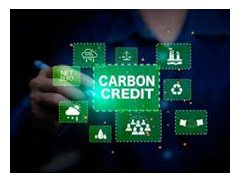INP-WealthPk
Faiza Tehseen
Carbon credit (CC) trading is necessary for Pakistan to mitigate the environmental impacts and generate revenue. Pakistan can become a good CC buying and selling market through systematic awareness, Muhammad Niaz Khan Kakar, Conservator Forests Quetta/ Project Director – UPGG Wildlife and REDD+ Expert told WealthPK.

“According to the Global Climate Risk Index (GCRI), Pakistan is one of the 10 most climate-vulnerable countries. From 1998 to 2018, the country faced 152 weather extremities and lost 500 lives along with 0.53% cut in GDP. This situation can be avoided in future only through systematic awareness. By doing so, the country can not only better mitigate the climate impact but also make the forests sustainable business hubs,” he said. Forests are the actual carbon sinks and their expansion can be incentivized through CCs. According to a report by Pakistan Environmental Protection Agency, Pakistan has the potential to generate about 20 to 25 million CCs per annum through various projects.
Selling CCs is going to be a great revenue generation source for developing countries. CCs are the permits allowing a certain amount of carbon emissions to a country/organization. They can generate income besides cutting greenhouse gases. One CC represents a ton of carbon dioxide. Niaz said, “The global CC market is projected to grow to USD2,407.8 billion by the year 2027 from USD211.5 billion in 2019. A well-established CC market can open a window of opportunities and value chains in Pakistan by bringing economic stability and growth. Pakistan can be one of successful countries earning handsomely through CCs, like Kenya and India. Kenya improved domestic livelihood and revenue generation, while clean development mechanism projects brought millions of CCs and did boost its renewable energy sector as well”.
He said, “Pakistan needs to develop a proper set of rules and regulations to trade in CCs. A nationwide awareness campaign is also direly needed to sensitize people and attract local and foreign investment in CCs. Partnering with international organizations can also be fruitful for uplifting this market. In this way, the environmental issues can be addressed at both national and global levels”. Speaking to WealthPK, former IG forests in the Ministry of Environment Syed Mehmood Nasir said, “Besides establishing a CC-based economy in Pakistan, awareness is an important factor to consider.”
He said the world population is over seven billion now and the use of plastic and carbon-emitting products has increased. Centuries ago, carbon was safe in earthen valets but industrialization unveiled it in the form of coal, gas, and liquid fuel, which ultimately became a part of the atmosphere. He further said, “Three hundred years ago, the carbon level in the air was 278 parts per million (PPM), and it has now increased by 420PPM to 421PPM. The earth can bear carbon increase to a certain limit. An increase of 350PPM can change the whole formation of life/environment. If it continues to increase, it is likely to cross 500PPM, which will be enough to wave off glaciers, rivers, and rains to a large extent”.
He said, “In the world today, every country, including Pakistan, has made its National Determined Commitment (NDC) to eliminate carbon at a specific level, which finally leads to zero carbon. Every country has to prepare its greenhouse gas inventory”. He says, “To achieve this goal, the cheapest way is tree plantation in your or any other country. After following a long but complex procedure, the planted lot is certified for trade. Credits are named differently under different systems – mostly called CER (Certified Emission Reduction). In the European Union, they are called EM (European Mechanism). One unit of carbon credits represents a ton of carbon”.
The carbon credit market is of two types: voluntary and regulatory. In the voluntary market, all activities are performed but are never registered or are under any legislation. The regulatory market follows all quality standards, registry, and legislative processes. The trade shares in the carbon credit market are showing a good output. With the growing trend to invest in the carbon markets, sooner or later, it would be mandatory for every country to trade in carbon credits. So, the policymakers in Pakistan must consider this issue seriously and conduct regular programs to create awareness.
Credit: INP-WealthPk













